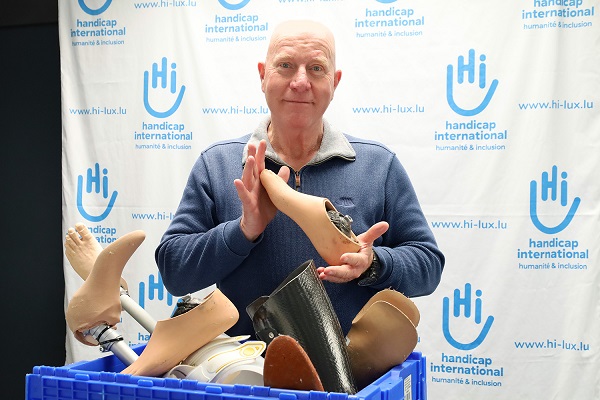 Patrick Le Folcalvez, Luxembourg-based rehabilitation expert for Handicap International, pictured with used prostheses;
Credit: © HI 2025
Patrick Le Folcalvez, Luxembourg-based rehabilitation expert for Handicap International, pictured with used prostheses;
Credit: © HI 2025
Handicap International has reported that the Rehazenter rehabilitation centre in Luxembourg donated about ten used prostheses (artificial limbs) to the NGO's prosthesis recycling initiative this month.
The initiative aims to recycle the materials that are still usable to integrate them into devices for disabled people in the countries where the NGO operates.
Handicap International explained that the National Health Fund (CNS) in Luxembourg allows insured amputees to replace their prosthesis every three years. The components, particularly the mechanical elements, have a minimum lifespan of ten years but are generally thrown away each time they are replaced. They can be worth several hundred euros, according to the NGO.
In order to avoid such waste, Handicap International has set up a recycling system to allow amputees in less privileged countries to benefit from quality devices. The high-tech materials recovered in Europe and packaged by volunteer experts are integrated into devices produced locally in the countries where Handicap International is active.
For the NGO in Luxembourg, it is a volunteer orthotist, Jonathan Thomas, who takes apart the prostheses in his laboratory in Thionville (France) before shipping them to a dedicated warehouse near Lyon (France). As part of this initiative, since 2018, more than 1,500 prostheses per year have been recycled for the benefit of amputees in partner countries.
Handicap International noted that more than 30 million people worldwide need to be fitted with a prosthesis, but only 5 to 15% actually have one. Access to the equipment remains very limited, particularly due to the lack of availability of orthopedic components and their high cost. Patrick Le Folcalvez, a Luxembourg-based rehabilitation expert for Handicap International, stated: "For these people, the lack of equipment can be a terrible sentence: it is often their only hope of returning to a semblance of normal life, the possibility of being able to walk again, return to work, support their family, etc. This recycling programme is important to us."
The Rehazenter's donation for this initiative is around ten prostheses, a figure that the NGO said will make a difference for many people waiting for a prosthesis. Gaston Schütz, Director General of Rehazenter, commented: "This is an honourable project on several levels and we will renew these donations as soon as we have the opportunity. We have also informed our patients of this possibility."
In 2024, Handicap International sent prosthesis parts to Uganda, Rwanda, Togo, Cameroon, Ethiopia and Yemen. For the latter country, this shipment will allow students from the country's first class of orthotists to practise their profession with different types of components.
Individuals may also donate used prostheses to Handicap International by dropping them off at the NGO's office in Luxembourg-Gare/Hollerich (140 Rue Adolphe Fischer).








